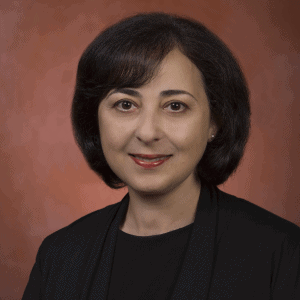 Florida State University School of Communication Science and Disorders Assistant Professor Sana Tibi presented work during the Experimental Arab Linguistics (EXAL) international conference in early April. Her presentation featured research on the features that contribute to Arabic letter knowledge. This presentation is a result of work in progress that follows from an earlier publication on Arabic letter knowledge among native Arabic-speaking kindergarten children, “IRT Analyses of Arabic Letter Knowledge in Kindergarten.”
Florida State University School of Communication Science and Disorders Assistant Professor Sana Tibi presented work during the Experimental Arab Linguistics (EXAL) international conference in early April. Her presentation featured research on the features that contribute to Arabic letter knowledge. This presentation is a result of work in progress that follows from an earlier publication on Arabic letter knowledge among native Arabic-speaking kindergarten children, “IRT Analyses of Arabic Letter Knowledge in Kindergarten.”
“Learning about Arabic letter knowledge is instrumental, not only for the millions who speak Arabic, but also for the different languages that use its alphabet, and for learners of Arabic as a second language,” said Dr. Tibi. “Hundreds of millions across the world use the Arabic alphabetic system. Our research findings clearly show the different factors that contribute to Arabic letter knowledge.”
Dr. Tibi’s research specifically investigates the early predictors of reading in Arabic, a fitting topic for the EXAL conference. EXAL is an annual event attended by an international community of linguistics scholars and researchers from related fields. These individuals employ experimental methods to study the Arabic language and exchange innovative ideas and approaches to Arabic linguistics.
Dr. Tibi’s research on Arabic literacy is important because of “The new global changes around the world led to Arabic speaking refugees resettling in the US and Europe,” said Dr. Tibi. “This has placed an increasing demand on supporting their language and literacy skills.”
“My research findings contribute to the scientific body of research in reading and inform us about cross-linguistic differences and similarities,” Dr. Tibi said. “The work seeks to understand the cognitive processes of reading Arabic and also develop and validate Arabic reading assessment tools with psychometric properties which is instrumental for researchers and measuring and monitoring student progress, and contribute to developing Arabic reading intervention programs based on scientific evidence to benefit vulnerable populations such as children at risk for reading failure.”
Dr. Tibi is affiliated with FSU FCRR and collaborates with Professor Chris Schatschneider and doctoral student Ashley A. Edwards from FSU Department of Psychology. To read their recent published work on Arabic letter knowledge, click here. Other authors on the paper include FSU Department of Psychology Professor Dr. Chris Schatschneider and doctoral student Ashley A. Edwards and they are all affiliated with the Florida Center for Reading Research.
Dr. Tibi was also selected to receive the School of Communication Science and Disorders Faculty Research award for her efforts. Congratulations, Dr. Tibi!
